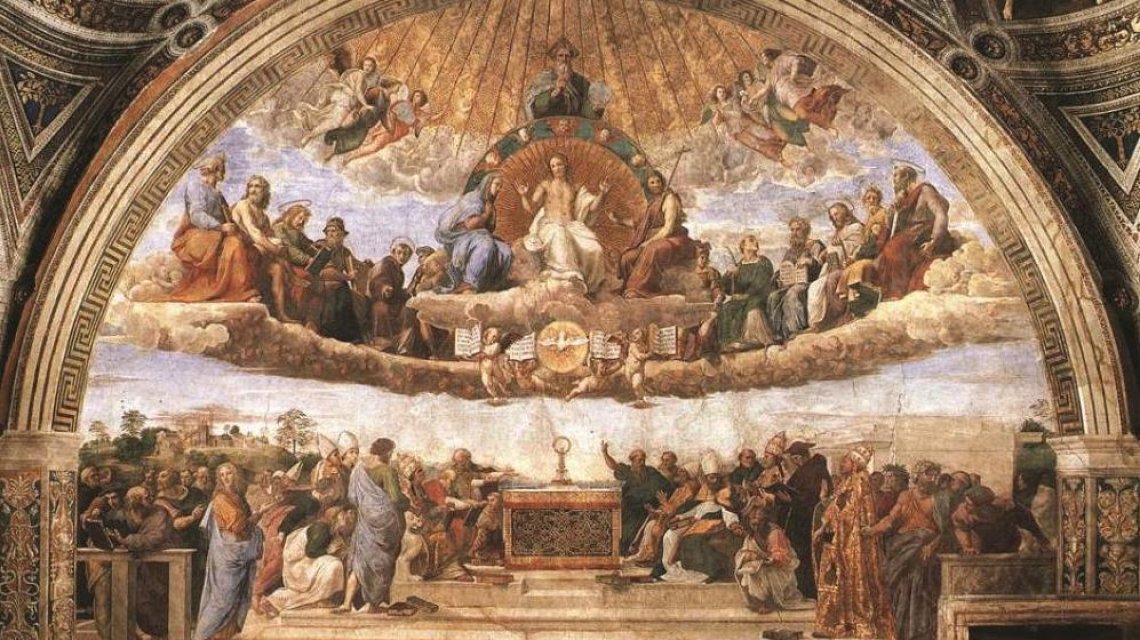The Nicene Creed - Part 8

The Church
I believe in one, holy, catholic and apostolic Church.
After we have spent some time professing our faith in the Triune God, the Creed moves immediately to the Church. This is no accident. Early on in the Scriptures, we read how God freed Israel from slavery and brought the Israelites to Mount Sinai to make a covenant with them. He will be their God; they will be His people. They are given the Torah, the Law, and are called to be holy, that they might be a witness of God to one another and, ultimately, to the whole world. The Church recognizes itself as the heir to this covenant through the New Covenant offered in Christ. Christ, through His Passion, death, and resurrection, saves us from our slavery to sin (and to all that separates us from Him) that we might be His people and witness to His saving love to the world.
This brief and seemingly simple sentence in the Creed is our constitution as the people of God. In it, we profess what are known in our tradition as the four marks of the Church. These are attributes given to the Church by Christ and belong to the very essence of what it means to be Church.
The Church is one but in the same way that God is One: a Trinity of Persons and yet one God. Just so, the Church includes, by its very nature, a wondrous diversity of gifts of the Holy Spirit, while also knowing a profound unity based on faith, hope, and love in God. The Church is holy because God is holy. We have been called from the world to belong fundamentally to God. We live no longer for ourselves but for Him. The Church is catholic because God is all in all. In Christ, every human distinction that once separated us is broken down. All are welcome to answer His call. The Church is apostolic because Christ came to do the Father’s will and then sent the apostles to do the same. The pope and bishops, as successors of the apostles, continue the apostles’ ministry in the Church and to the world.
The Church is one. We can fail to witness to this if we stress the unity of the Church so much that we fail to see that the diversity of gifts and callings is God’s will. We can stress the diversity of the Church so much that we make of the Church a group of individuals who have almost nothing in common.
The Church is holy. We can fail to witness to this if we fail to encourage those who are striving for holiness but need compassion and guidance. We can also fail if we are so concerned about appearing “nice” or “looking good” that we fail to challenge one another to abandon all the stumbling stones to holiness. St. Edith Stein reminds us that love cannot be love without truth, nor can truth be truth without love.
The Church is catholic. We can fail to witness to this by acting as though only people of a certain ethnic group or political persuasion are true Catholics. We can also fail when we make choices on a parish or diocesan level that include or welcome some but leave others out. This is a good test for any decision we make as Church: who is being left out?
The Church is apostolic. We can fail to witness to this by giving the impression that only the opinions of our own generation or era count, thus ignoring the wisdom of past ages and disenfranchising all those who came before us. Tradition, as Chesterton reminds us, is “the democracy of the dead.” People of former times remind us of what we have forgotten in our own time and become a good reality check for us in our own journey of faith. The pope and bishops have a particular role to play here. They are our umpires who tell us if our actions are “safe” or “out” according to the law of the Lord.
It is my hope and my prayer that these few words may encourage much prayerful reflection and discussion on what it means for us to be part of the Church.
For further reflection:
Vatican II, Lumen Gentium (Dogmatic Constitution on the Church)
Catechism of the Catholic Church, nn. 748-975
By: Father Mark Nolette, a priest of the Diocese of Portland










